Vol. 7, No. 91, August 5, 2025
In This Issue…
- President’s Message
- Victory in Shanghai: An Asian American Family Wins Its Place in America in WWII
- Recounting the Gothic Line with WWII Veteran Yoshio Nakamura
- Day of Affirmation
- Volunteer Opportunities
- Upcoming JAVA Events
Presidents Message
Washington, D.C.
JAVA Members & Friends,
We’re excited to share that JAVA has launched a new email discussion platform for you, the JAVA Members & Friends group! This space is designed to encourage respectful conversations, foster collaboration, and keep everyone in the loop with meaningful updates. As we grow this community, I’m committed to making sure it reflects the core values that define JAVA — honor, respect, and excellence.
The platform is managed by Gabriel Okamoto, our Digital Community & Collaboration Coordinator. Gabriel also serves in the U.S. Army Reserve, and we’re fortunate to have his leadership on this effort. If you’d like to join the platform or learn more, feel free to reach out to our Executive Director, Antoinette Phelps, at [email protected].
History Research Committee – Volunteers Welcome
We’ve recently formed a new committee focused on uncovering and correcting historical inaccuracies—particularly those related to WWII Nisei soldiers, though we welcome broader inquiries as well. Through our work, we’ve discovered that even well-established sources—including some government websites—contain errors or outdated information. In fact, there are still some inaccuracies on JAVA’s own website that we’re working to fix.
Our goal is to work collaboratively with the appropriate institutions to ensure the historical record is accurate and that the public—and our members—are referencing reliable information when writing articles, speeches, or educational materials.
If this sounds like something you’d be passionate about, I’d love to hear from you!
Warm regards,
Howard High
Victory in Shanghai: An Asian American Family Wins Its Place in America in WWII
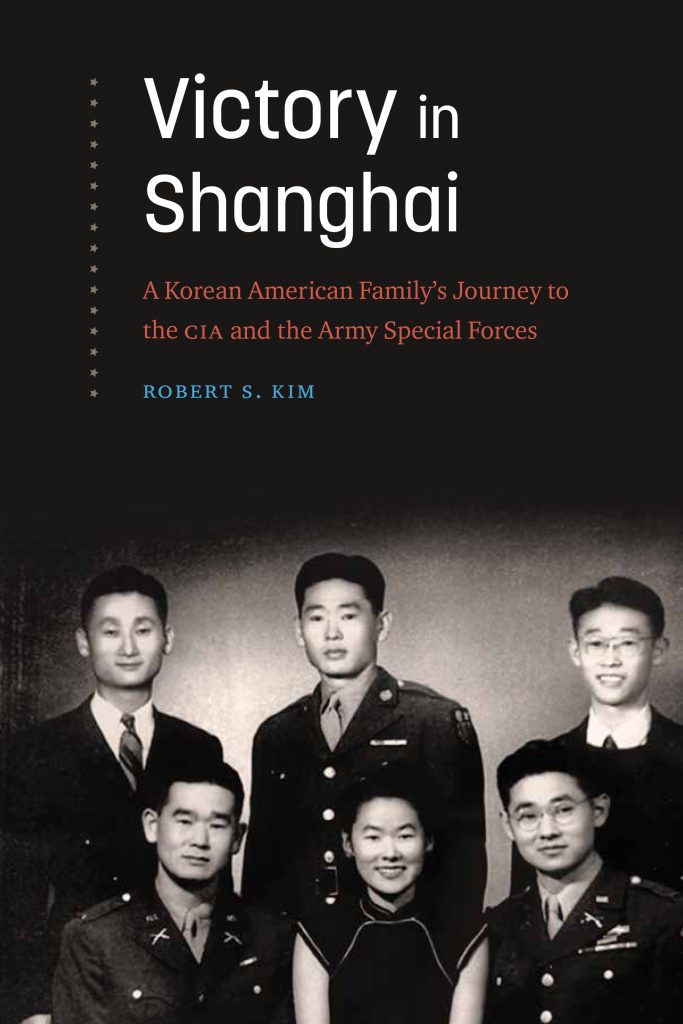
Written by: Robert S. Kim
Washington, D.C.
August 17, 2025 is the 80th anniversary of a singular event in the history of Asians in America. On that day, a U.S. Army enlisted man named Peter Kim embarked on a secret mission to Shanghai with lieutenant’s bars on his uniform, bearing credentials as the official representative of the Supreme Allied Commander in China. His actions from then to V-J Day would make him a celebrated figure in the U.S. Army in China and bring his family’s quarter century long struggle to come to America to a successful conclusion.
Peter Kim: Asian American in Exile
Dr. Kim Chang Sei, one of Korea’s first medical doctors, and Lee Chung Sil, sister in law of the Korean patriot and Korean-American community leader Dosan Ahn Chang Ho, sought to bring their family to America and raise them as Americans in the 1920s. Forced to leave the country after the enactment of the Immigration Act of 1924, they settled down in Shanghai, where they could live as part of the city’s American expatriate community. Their eldest son Peter became the head of the family after Dr. Kim committed suicide in 1934 in New York, where he had been practicing medicine and trying to arrange for the family to join him.
After Japan occupied the Shanghai International Settlement in December 1941, Peter Kim emerged as a leader of the city’s persecuted American community, working for the consulate of neutral Switzerland to defend the rights of U.S. citizens and organize the release and evacuation of thousands of American and Allied nation civilians. In May 1944, he escaped Shanghai with his younger brother Richard and journeyed to free China, where they enlisted in the U.S. Army. As an intelligence specialist, he became the leading expert on Japanese-occupied China, but not being a U.S. citizen, he remained an enlisted man instead of an officer.
Lieutenant James Kim, U.S. Army
Peter Kim’s younger brother James, born a U.S. citizen in Los Angeles, became a U.S. Army infantry officer in the 40th Infantry Division, fighting in the Pacific campaign. In January 1945, the division landed on the Philippine island of Luzon in the campaign to liberate Manila, in which Lt. Kim was awarded the Bronze Star for capturing his regiment’s first Japanese POW. Made an intelligence officer, he worked with Nisei MIS interpreters for the rest of the war.
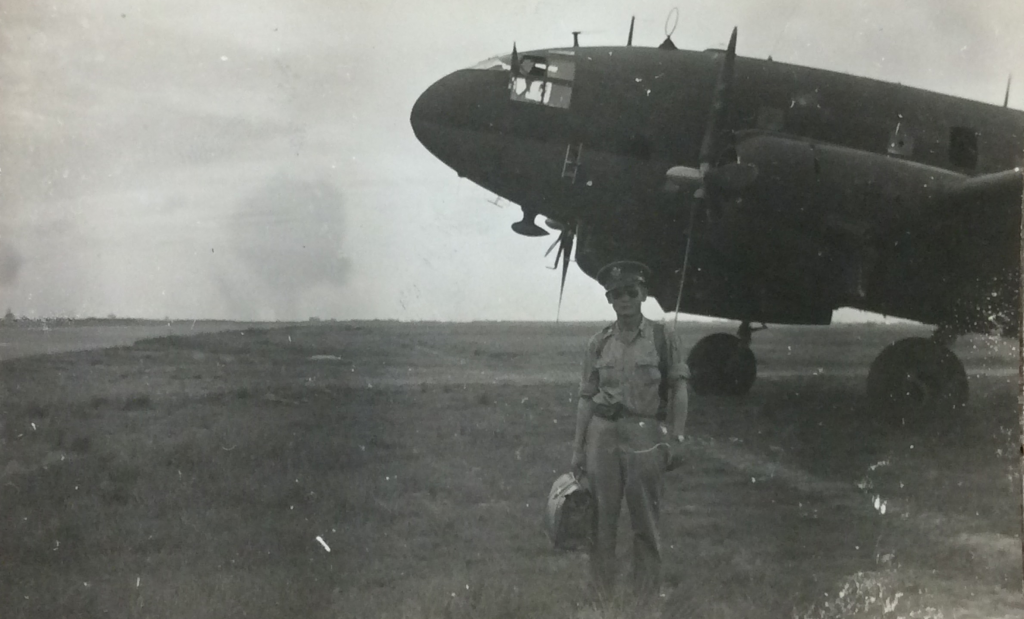
Mission to Shanghai: Operation Sparrow
On August 15, 1945, the declaration of Japan’s intent to surrender initiated a rush to plan and organize missions to liberate Allied military personnel and civilians held in POW and civilian internment camps in China and French Indochina. Peter Kim’s commanding officers arranged for him to be made a leader of the mission to Shanghai, called Operation Sparrow, as the official representative of Supreme Allied Commander LTG Albert Wedemeyer. Operation Sparrow succeeded in liberating 7,000 American and Allied nation civilians and rushing urgently needed food and medical supplies to them. Peter Kim, irregularly commissioned as a First Lieutenant for his role in the mission, supervised the restoration of the homes and property of U.S. citizens, then managed their repatriation for the U.S. Consul in Shanghai after V-J Day.
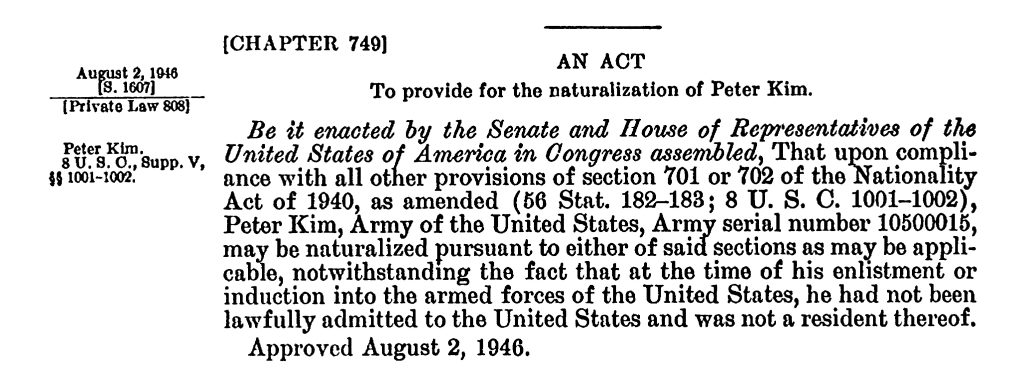
Three Acts of Congress for the Kim Family
In recognition of Peter Kim’s extraordinary actions in Shanghai in August 1945, his commanding officers launched a campaign to lobby Congress to pass a special law granting him U.S. citizenship, with the full support of LTG Wedemeyer. On August 2, 1946, President Truman signed into law Private Law 808, an act to provide for the naturalization of Peter Kim.
Empowered by their experiences in the Second World War as officers in the U.S. Army, Peter and James Kim fought for additional legislation to admit the rest of their family into the United States. Their efforts resulted in a 1949 act of Congress granting permanent residence to their younger brother Richard, who had ended the war as a U.S. Army Staff Sergeant, and a 1950 act admitting their mother and brothers David and Arthur, the latter passed while their mother, David, and sister Betty (a U.S. citizen) were refugees stranded in Hong Kong after the outbreak of the Korean War.
Four Careers in Intelligence and Special Operations
Peter, James, Richard, and Arthur Kim each went on to lengthy and successful careers in the Army and the CIA. Peter served as an Army intelligence officer, retiring as a Major in 1965. James was detailed to the CIA during the Korean War, starting a quarter century long career in the CIA in which he became one of the first Asian-Americans promoted to the agency’s senior leadership ranks in the 1960s. Richard served in the CIA during the Korean War era and then joined the recently created Army Special Forces. He retired as a Lieutenant Colonel in 1971 to become an Episcopalian minister. Arthur served in Army intelligence during the Korean War before starting a 22-year-long career in the CIA, after which he started a successful private security company whose projects included supervising countersurveillance measures in the reconstruction of the U.S. Embassy in Moscow in the 1980s.
Peter and James Kim passed away in 1995 and 2001, respectively. Richard and Arthur Kim are still alive at the ages of 98 and 95, living links to the Second World War era.
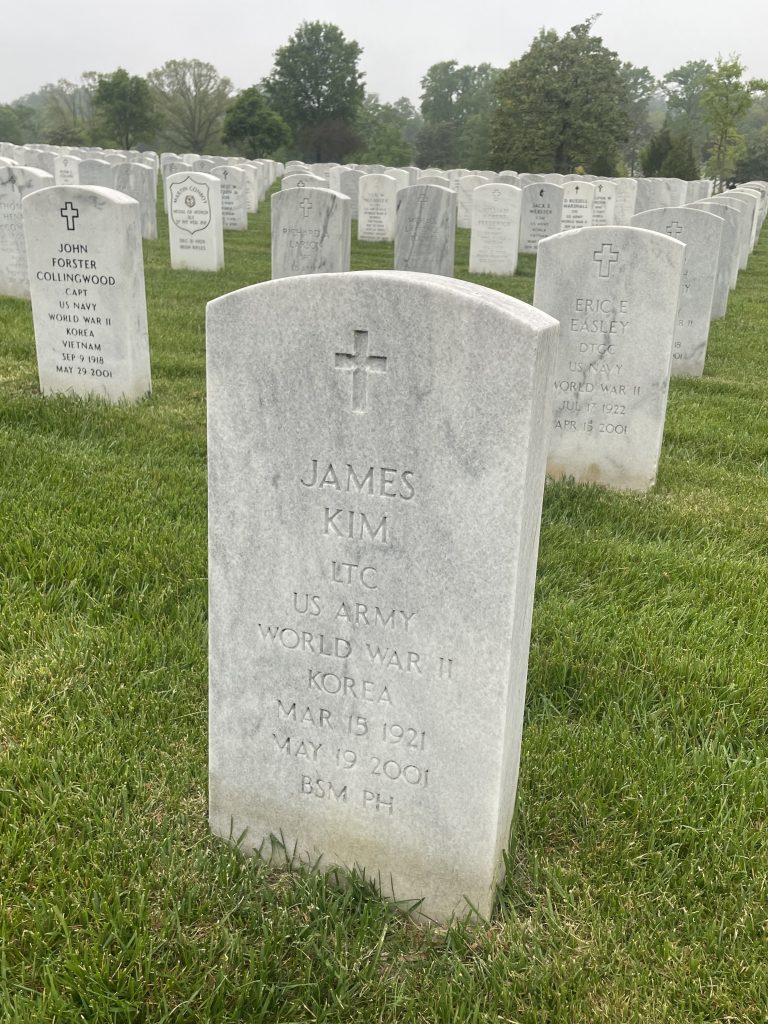
Belated Recognition
The professional respect for secrecy of the Kim brothers led them to withhold their family’s story from the public until recently. In June 2025, their silence ended with the publication of Victory in Shanghai: A Korean American Family’s Journey to the CIA and the Army Special Forces, by Robert Kim (no relation).
Efforts to secure further recognition for wartime actions of the Kim brothers are ongoing, including nominating Peter Kim for admission to the Army’s Military Intelligence Corps Hall of Fame for his actions in Shanghai with Operation Sparrow.
Recounting the Gothic Line with WWII Veteran Yoshio Nakamura
Written By: Joe Kirwin
Brussels, Belgium
Soon after the surprise Dec. 7, 1941 attack on Pearl Harbor in Hawaii when Japanese forces destroyed much of the U.S. Navy and Air Force Pacific Ocean presence, U.S. President Franklin Roosevelt ordered the arrest of more than 120,000 Japanese Americans living in the United States. They were forced from their homes, farms and businesses and locked up in internment camps in the deserts of the western United States. Yoshio Nakamura and his family were among those that lost everything. They were considered national security threats that could not be trusted.
Two years after the mass incarceration, the U.S. War Department, entering the third year of fighting WW II fronts in the Pacific and in Europe, faced a troop shortage. Suddenly imprisoned Japanese American men 18-years and older who were born in the United States were seen as a solution instead of spies. So the U.S. government allowed the Japanese-Americans men 18 and over to leave the prison camps but only if they agreed to join the U.S. Army and fight the Nazis in Italy or the Japanese in the Pacific. The injustice and hypocrisy was too much for many of the imprisoned Japanese Americans men and they refused . But for others it was an opportunity to prove their allegiance to the United States. Yoshio Nakamura was one of the latter. Even though his family members remained locked up in the desert until the end of the war, he would join the 442nd Japanese American regiment. It would go onto become one of the most decorated U.S. Army units in WW II.
Now living in southern California, where he was born and raised, 100-year-old Yoshio Nakamura explained why he decided to join the U.S. Army and also recounted in vivid detail a crucial nighttime climb up Monte Folgorito to destroy one of the enemy mortar and artillery bunkers as if it occurred recently instead of 80 years ago. Yoshio also recounted how a half century later the U.S. government apologized for the gross injustice imposed on Japanese Americans during WW II.
The podcast is available on Spotify, Apple Podcast, Amazon Music and other podcast platforms
(Ed Note: This is the synopis taken from the podcast description that Mr. Joe Kirwin has graciously allowed us to use. For more information contact Joe Kirwin at [email protected])
Day of Affirmation Ceremony
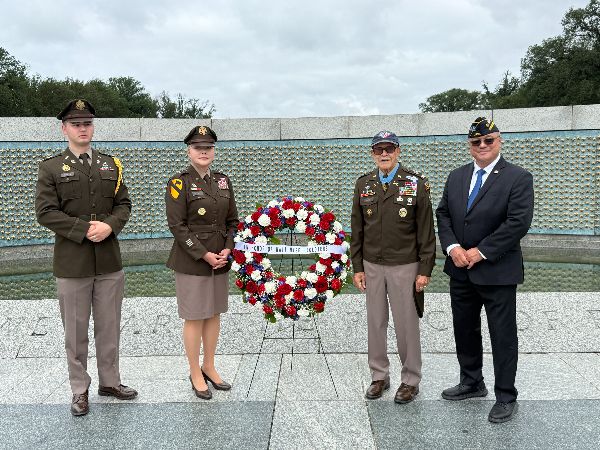
Washington, D.C.
Written By: LTC Robert H. Vokac, USA (Ret)
On Tuesday, July 15, 2025, JAVA recognized the “Day of Affirmation” with a ceremony at the National World War II Memorial, followed by a luncheon at the Army and Navy Club.
JAVA’s President, Mr. Howard High, opened the “Day of Affirmation” ceremony with brief remarks, reminding attendees not only of the historical importance of July 15, 1946, but of the need to carry the values of loyalty and service into the future.
JAVA was honored with the presence of BG W. Maria Bochat, Commander of the 20th CBRNE Command, and COL (R) Paris Davis, a Medal of Honor recipient from the Vietnam War. BG Bochat and COL (R) Davis delivered eloquent remarks, appropriate for such a meaningful day.
Following the remarks, a wreath was presented to honor the Nisei veterans of World
War II. The wreath was presented by Howard High, BG Bochat, and COL (R) Davis with LTC (R) Mark Nakagawa and 1LT Tom Knight, aide-de-camp to BG Bochat, acting as the wreath bearers.
The ceremony was live-streamed on our Facebook page and remains available for viewing.
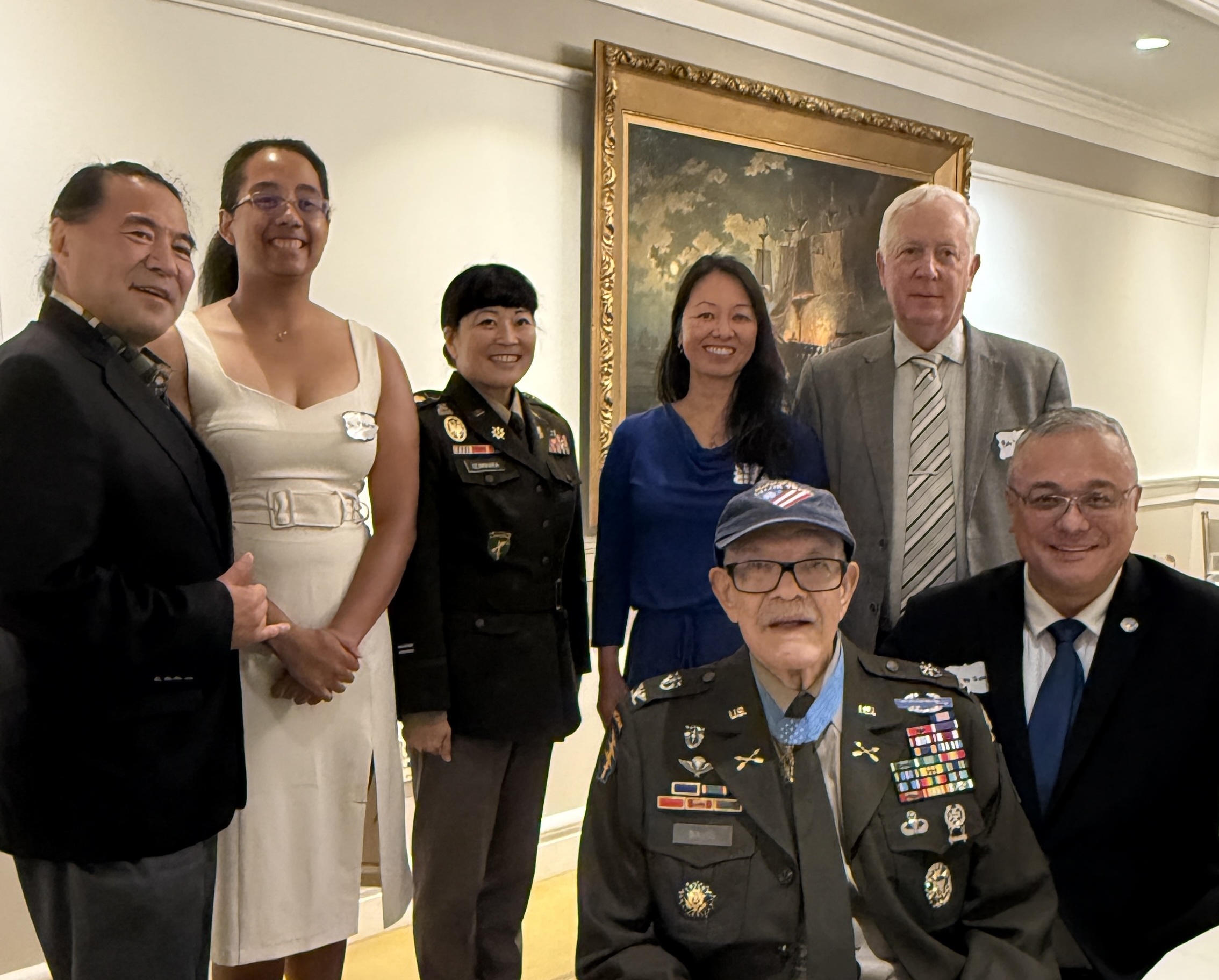
Following the ceremony, a luncheon was held at the historic Army and Navy Club with COL (R) Davis as the keynote speaker. JAVA was honored with the presence of JAVA members and friends, including two representatives from the Embassy of Japan. COL (R) Davis emphasized the importance that the United States of America belongs to all of us, regardless of our background. He reminded everyone of the importance of who we are as a nation and what this nation represents. Notwithstanding existing political tensions, COL (R) Davis reminded all of us that we must fulfill the ideals of our country.
2026 will bring the 80th Anniversary of the Day of Affirmation. Initial plans are underway for a very special day, one that you will want to attend.
President High’s Remarks for the Day of Affirmation
It is a profound honor to stand before you today on this important occasion—the Day of Affirmation.
Each year on July 15, we come together to commemorate and honor the remarkable legacy of Japanese Americans who served in the U.S. military during World War II.
This date is far more than a mark on the calendar—it is a powerful reminder of courage, sacrifice, and the unyielding spirit of those who defended our nation both overseas and here at home.
On July 15, 1946, President Harry S. Truman stood on the White House lawn and welcomed home the 100th Infantry Battalion and the 442nd Regimental Combat Team.
In words that continue to echo through history, he told them, “You fought the enemy abroad, and you fought prejudice at home—and you won.”
That simple yet profound statement captures the essence of what these brave soldiers endured.
Their battles were twofold: against a foreign enemy on the battlefield, and against discrimination and doubt in their own country.
The Day of Affirmation is not just about looking back—it is about reaffirming the values that these soldiers embodied: courage, honor, equality, and sacrifice.
It is a day for us, as a community and as a nation, to reflect on their contributions and to recognize the strength it took to serve a country that, at the time, questioned their loyalty.
Despite facing harsh prejudice—including the forced incarceration of some of their families—these young men answered the call to serve.
They volunteered, they trained, and they fought with distinction in some of the most brutal campaigns of the war.
And in doing so, they not only helped defeat tyranny abroad—they also helped break down the barriers of injustice here at home.
Their legacy is one of resilience and heroism.
It is a legacy that challenges us to confront prejudice in all its forms, to stand up for what is right, and to work toward a more just and inclusive society.
Today, we are deeply honored to be joined by two extraordinary individuals who embody the highest values of our military and our nation.
Brigadier General Bochat, the commanding general of the 20th CBRNE Command, and Colonel (U.S. Army Retired) Paris Davis, a Medal of Honor recipient, will share a few words with us.
Their presence adds great meaning to today’s observance, and we are grateful for their leadership, their service, and their continued example of integrity and valor.
Upcoming JAVA Events

Tuesday, November 11. Veterans Day Program, National Japanese American Memorial to Patriotism During World War II, Washington DC.
